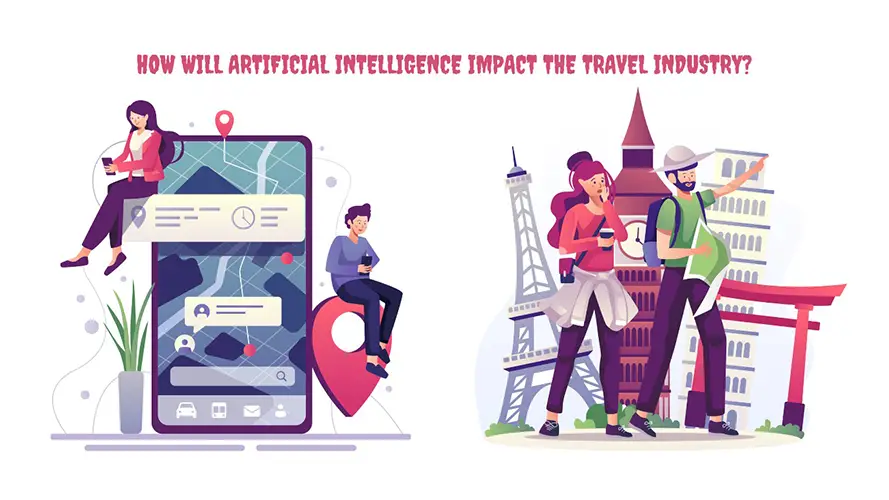Travel
How Will Artificial Intelligence Impact the Travel Industry?


Technology has become our most trusted companion in almost every aspect of life. From ordering food to managing finances, technology has simplified tasks, and the travel industry is no exception. With the high rise of AI in the travel industry, it is undergoing a remarkable transformation. Today, AI is not just a buzzword; it’s a game-changer, revolutionizing how we plan, book, and experience travel.

Artificial Intelligence in Tourism
Artificial Intelligence is predicted to profoundly impact the travel industry, reshaping how we navigate the globe. With AI algorithms becoming increasingly sophisticated, travel companies can offer personalized experiences tailored to individual preferences. From finding the best deals on airline tickets to planning travel activities, AI has taken upon the entire travel process.
Traditionally, human-intensive tasks are now seamlessly handled by AI algorithms, saving businesses time and resources. With AI’s ability to learn from interactions, customer service has become more responsive, enhancing satisfaction. Moreover, AI’s capabilities extend to data analysis, calculations, and problem-solving. This integration of artificial intelligence in tourism not only streamlines processes but also minimizes human error, ensuring tasks are executed swiftly and accurately, round the clock.
What is the common use of AI in the travel industry?
1. Personalized Recommendations
Artificial Intelligence (AI) redefines how travelers explore the world by offering personalized recommendations tailored to their unique preferences. AI algorithms not only suggest destinations, accommodations, and activities that align with individual tastes but also analyze data such as past travel history, online behavior, and social media activity.
For instance, if you’ve previously shown an interest in adventure sports on social media, AI in tourism industrymight recommend destinations known for their adrenaline-pumping activities. This level of personalization enhances the travel experience, making it more relevant and enjoyable for each traveler.
2. Efficient Booking Process
AI streamlines the booking process by optimizing pricing strategies and ensuring seamless transactions. Advanced algorithms analyze market trends, demand patterns, and competitor pricing to offer competitive rates and maximize savings for travelers.
Airlines utilize dynamic pricing algorithms that adjust ticket prices based on demand, time until departure, and seat availability. Similarly, hotel booking platforms employ AI to recommend accommodations that meet travelers’ preferences while offering the best value for their budget. This efficiency simplifies the booking experience and enhances travelers’ satisfaction.
3. Enhanced Safety Measures
Safety is of utmost importance in the travel industry, and AI is revolutionizing how risks are evaluated and minimized. AI-driven systems analyze vast amounts of real-time data to pinpoint potential threats, bolster security measures, and forecast and prevent accidents or disruptions.
Airports employ AI-powered facial recognition technology to enhance security screenings, identify potential threats, and streamline boarding. Moreover, artificial intelligence in tourism scrutinizes historical data and weather patterns to anticipate natural disasters or other emergencies, ensuring travelers’ safety.
4. Improved Customer Service
AI-powered chatbots are transforming customer service in the travel industry. They provide instant assistance and resolve queries efficiently. Virtual assistants use machine learning and Natural Language Processing (NLP) to understand and respond to customer inquiries, offering 24/7 support across multiple channels.
Travel booking platforms integrate chatbots into their websites and mobile apps, allowing travelers to get immediate help with booking flights and accommodations or resolving issues with their reservations. This seamless integration of AI in travel industryhas enhanced the customer service travel experience by reducing wait times.
5. Predictive Analytics
AI enables travel companies to anticipate demand and adjust services accordingly through predictive analytics. Businesses can optimize resource allocation and stay ahead of competitors by analyzing extensive amounts of past data and customer behavior.
Airlines use predictive analytics to forecast passenger demand on specific routes, adjusting flight schedules and capacities to maximize revenue. Similarly, hotels use this to optimize room rates and inventory management, ensuring that rooms are priced competitively while minimizing vacancies. This proactive approach to decision-making based on data-driven insights drives efficiency and profitability in the travel industry.
6. Targeted Marketing Campaigns
AI in the tourism industry empowers travel companies to create targeted marketing campaigns based on customer preferences. By analyzing data from various sources, including browsing history, purchase patterns, and social media activity, businesses can personalize advertisements, promotions, and offers to maximize engagement and conversion rates.
Travel agencies can use AI-driven algorithms to segment customers based on their travel interests, demographics, and spending habits, delivering relevant and timely marketing messages tailored to each segment. This targeted approach not only improves marketing efforts but also enhances customer loyalty.
7. Real-time Translation Services
Thanks to AI-powered translation services, language barriers are no longer an issue when traveling. Advanced machine learning algorithms enable real-time spoken and written language translation, allowing travelers to communicate seamlessly with locals, navigate foreign environments, and immerse themselves in new cultures.
Smartphone apps with AI-driven translation capabilities can instantly translate signs, menus, and conversations into the traveler’s preferred language, facilitating communication. This accessibility breaks down barriers to travel, making it easier for people from different linguistic backgrounds to explore the world and connect with others.
Conclusion
Artificial Intelligence is reshaping the travel industry’s future, steering in a new era of efficiency and personalization. With its continuous development, artificial intelligence’s impact on the tourism industry is increasing, and we can expect even more innovative solutions to make travel more accessible, enjoyable, and memorable.
However, amidst the excitement of technological advancements, let’s remember the importance of human connection in travel. While AI can enhance convenience and streamline processes, the human touch enriches our travel experiences. Ultimately, striking a balance between AI, travel, and the human aspect is critical to ensuring a fulfilling and enriching travel experience.







:max_bytes(150000):strip_icc()/roundup-writereditor-loved-deals-tout-f5de51f85de145b2b1eb99cdb7b6cb84.jpg)


